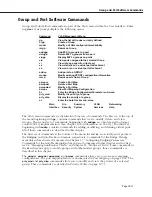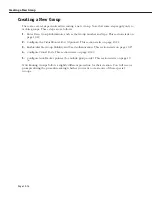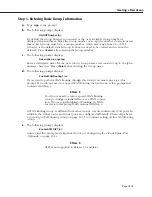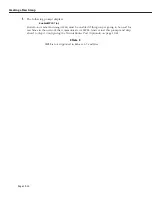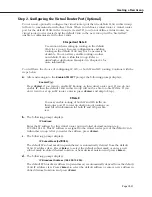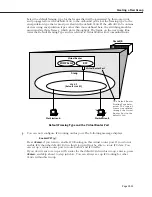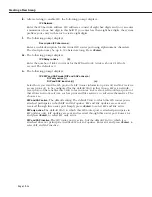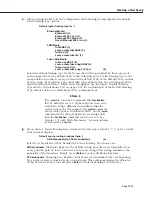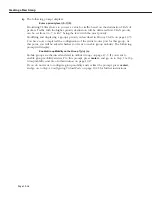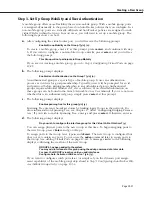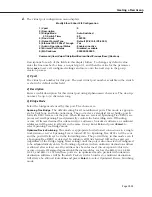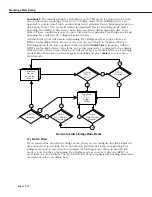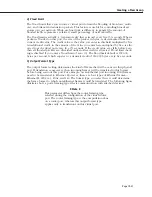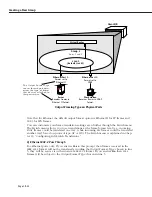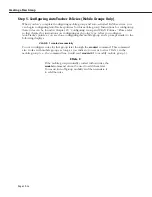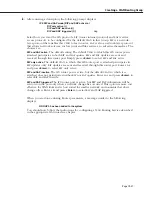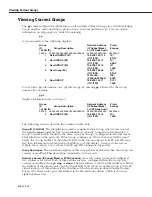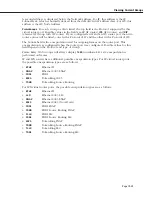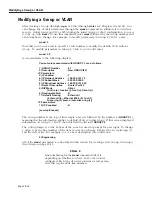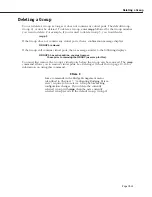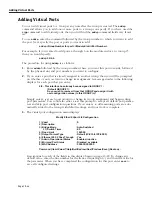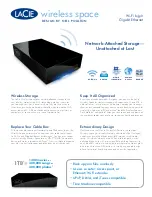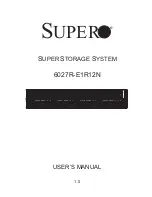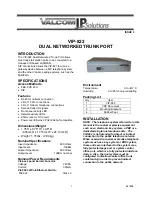
Creating a New Group
Page 19-31
4) Flood Limit
The flood limit allows you to tune a virtual port to limit the flooding of broadcast, multi-
cast, and unknown destination packets. This feature is useful for controlling broadcast
storms on your network. While each network is different, in general the amount of
flooded traffic represents a relatively small percentage of network traffic.
The flood limit is actually a “transmit credit” that is issued every five (5) seconds. When a
packet is flooded on this port, the size of the packet, in bytes, is decremented from the
current credit value. The credit value is the value you enter in this field multiplied by five.
An additional credit, in the amount of the value you enter here multiplied by five, is allo-
cated to each virtual port every five (5) seconds. If the credit value ever falls below zero,
then all flooded packets are discarded until another credit is allocated. Flood limit check-
ing is disabled if you enter a flood limit of zero (0). The flood limit default is 192,000
bytes per second, which equates to a transmit credit of 960,000 bytes every five seconds.
5) Output Format Type
The output format setting determines the kind of frame that will be sent out this physical
port. If translation is necessary, then incoming frames will be translated to this format
before being sent out this port. For example, on an Ethernet port incoming
FDDI
frames
need to be translated to Ethernet. However, there are four types of Ethernet frames—
Ethernet II,
IPX 802.3
,
SNAP
, and
LLC
. The format type you select here would determine
the frame format to which non-Ethernet frames would be translated. The following figure
illustrates how a port’s framing type affects communication with attached devices.
♦
Note
♦
This parameter differs from the router framing type
selected during the configuration of the virtual router
port. The router framing type is the encapsulation done
on a router port, whereas this output format type
applies only to translations on this virtual port.
Summary of Contents for Omni Switch/Router
Page 1: ...Part No 060166 10 Rev C March 2005 Omni Switch Router User Manual Release 4 5 www alcatel com ...
Page 4: ...page iv ...
Page 110: ...WAN Modules Page 3 40 ...
Page 156: ...UI Table Filtering Using Search and Filter Commands Page 4 46 ...
Page 164: ...Using ZMODEM Page 5 8 ...
Page 186: ...Displaying and Setting the Swap State Page 6 22 ...
Page 202: ...Creating a New File System Page 7 16 ...
Page 270: ...Displaying Secure Access Entries in the MPM Log Page 10 14 ...
Page 430: ...OmniChannel Page 15 16 ...
Page 496: ...Configuring Source Route to Transparent Bridging Page 17 48 ...
Page 542: ...Dissimilar LAN Switching Capabilities Page 18 46 ...
Page 646: ...Application Example DHCP Policies Page 20 30 ...
Page 660: ...GMAP Page 21 14 ...
Page 710: ...Viewing the Virtual Interface of Multicast VLANs Page 23 16 ...
Page 722: ...Application Example 5 Page 24 12 ...
Page 788: ...Viewing UDP Relay Statistics Page 26 24 ...
Page 872: ...The WAN Port Software Menu Page 28 46 ...
Page 960: ...Deleting a PPP Entity Page 30 22 ...
Page 978: ...Displaying Link Status Page 31 18 ...
Page 988: ...Displaying ISDN Configuration Entry Status Page 32 10 ...
Page 1024: ...Backup Services Commands Page 34 14 ...
Page 1062: ...Diagnostic Test Cable Schematics Page 36 24 ...
Page 1072: ...Configuring a Switch with an MPX Page A 10 ...
Page 1086: ...Page B 14 ...
Page 1100: ...Page I 14 Index ...

